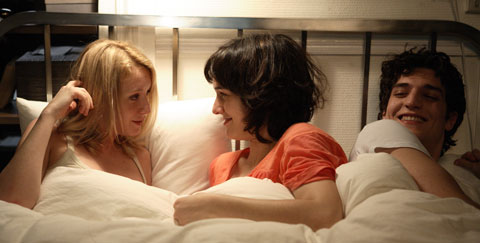
Love Songs, Christophe Honoré’s musical
trifle about loves lost and lorn on the streets and in the apartments
of Paris, doesn’t come into its own until around the halfway point.
The story about a girl, a boy, and a girl living together in the big
city is basically a beautiful, sophisticated soap opera punctuated by
the occasional musical number. The threesome of Ismael, Julie and
Alice is fairly well played by the brooding Louis Garrel (best known
as Eva Green’s creepy brother Theo in Bertolucci’s The Dreamers),
Ludivine Sagnier (the bombshell from Ozon’s Swimming Pool), and
Clotilde Hesme (new to me, though she appeared with Garrel in Regular
Lovers, directed by the famous elder Garrel, Philippe). A plot twist at around the half-hour
mark throws the relationship into disarray, but the film doesn’t find
its emotional core until the gentle, boyish-looking Erwann (Grégoire
Leprince-Ringuet) shows up, crooning sweet nothings at Ismael until
the latter succumbs — it’s the first time any of the film’s songs feels more than utterly perfunctory.
Certainly Honoré throws a change-up —
heterosexist viewers may consider it a bait and switch — as the
film switches focus from a conventional love triangle to its gay duo.
A scene in the first section of the film in which Ismael lounges in
bed as Julie and Alice pull their tops off (they’re seen only from
behind) is catnip for voyeurs, and perhaps a deliberate parody on the
male gaze that defines so much of romantic cinema. As arbitrary as
that shot is, it’s subverted by the increasingly glorious happiness
Honoré affords his more passionate lovers in the film’s second half.
Honoré has some fun with Ismael’s switch-hitting — as when Julie’s
sister, to her disappointment, finds him in bed with another man —
but the tongue-in-cheek climax, which has Ismael literally
spotlighted against the side of his apartment building as he comes to
terms with his identity as a lover, is full of enough kitschy
optimism to add at least the illusion of emotional meaning to the
thin stuff that comes before it. B-
